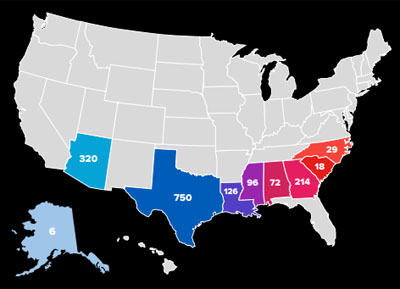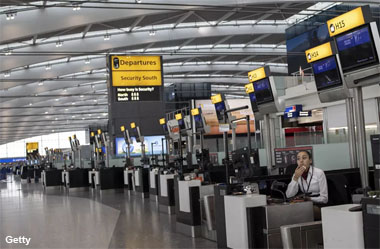NEWS ROUNDUP
Scab Meyer ● NLRB weakens union contracts ● App-based EMPLOYEES
Wednesday, September 11, 2019
LOCAL
 ► From In These Times — The next wave of labor unrest could be in grocery stores — On Aug. 24, members of UFCW Local 555 overwhelmingly voted to authorize a strike for 20,000 grocery employees at Safeway, Albertsons, QFC and Fred Meyer locations in the Pacific Northwest… Grocery workers there are demanding higher wages and an end to the gender pay gap that permeates their stores. They have established proof for the latter, commissioning a third-party group to produce a report on the issue. The research group Olympic Analytics looked at the data on hourly wage, gender, age, years of Fred Meyer experience, and job title for 1,919 Fred Meyer workers employed in the area. It found that women are almost twice as likely to be given lead positions, but make about an average of $1.68 less than their male counterparts at those positions. In 2018, nearly 80% of the store’s bakery employees were women, while the higher-paying produce department was male-dominated. The gap between these two departments has barely shifted over the last 81 years.
► From In These Times — The next wave of labor unrest could be in grocery stores — On Aug. 24, members of UFCW Local 555 overwhelmingly voted to authorize a strike for 20,000 grocery employees at Safeway, Albertsons, QFC and Fred Meyer locations in the Pacific Northwest… Grocery workers there are demanding higher wages and an end to the gender pay gap that permeates their stores. They have established proof for the latter, commissioning a third-party group to produce a report on the issue. The research group Olympic Analytics looked at the data on hourly wage, gender, age, years of Fred Meyer experience, and job title for 1,919 Fred Meyer workers employed in the area. It found that women are almost twice as likely to be given lead positions, but make about an average of $1.68 less than their male counterparts at those positions. In 2018, nearly 80% of the store’s bakery employees were women, while the higher-paying produce department was male-dominated. The gap between these two departments has barely shifted over the last 81 years.
EDITOR’S NOTE — And here is the appropriate response to Fred Meyer when the company defends its hiring of scabs in preparation for a strike…
Don’t worry, if there is a strike I will be buying my food elsewhere so no need to hire scabs. @ufcw555 https://t.co/PGvSfHM6Of
— L?gan Gilles (@logangilles) September 10, 2019
► From the Seattle P-I — Seattle teachers making starting salary spend 75% of income on rent, study finds — The study published Tuesday by real estate website Zillow found teachers who make a mid-career salary in Seattle would spend 47.6% of their income on rent. The typical rent payment in Seattle, according to the study, was $2,259. Veteran teachers in Seattle need to put about one-third of their salary toward rent.
► In today’s Spokesman-Review — Budget reckoning has left Spokane schools with bigger classes — At almost every school in Spokane, classrooms are filled with more students after budget cuts announced last spring led to the loss of about 100 teachers. According to preliminary numbers, more than 1,000 classes will hold at least 28 students each. Of those, more than 200 classes will have at least 31 students, a figure the district defines as a “hot spot” for immediate attention.
► In today’s Seattle Times — A blast from the past in the gay-rights wars (by Danny Westneat) — Sometimes it feels like the news is coming through some sort of time warp. Such as: The story this week about how a Christian school in Shoreline is teaching that being gay or lesbian is “unnatural” and is “a result of the failure to worship God.” Ok, it’s not the year 1959, I’m pretty sure. It’s not even 2009 anymore, when this kind of destructive stuff was, I naively thought, in its last gasps.
► From KUOW — Seattle is losing police officers. There’s a $1.6 million plan to fix that. — Seattle’s police department is losing officers faster than any time in the past six years, going back to 2012. Ten percent of Seattle police personnel quit in 2018, according to a new SPD report out Tuesday about police hiring, retention and recruitment. Mayor Jenny Durkan and Police Chief Carmen Best are proposing a $1.6 million package in the 2020 budget to help fix the officer shortage.
BOEING
► In today’s (Everett) Herald — Boeing 737 Max jet to face separate test by EU regulators — The possible requirement of new equipment would significantly complicate the plane’s return to service.
► In the PSBJ — Boeing prepares Moses Lake for big role in 737 Max return to service (subscription req’d) Boeing has leased property at the Moses Lake Airport to store 737 Max jets and is preparing to lease even more land at the former base for B-52 bombers.
THAT WASHINGTON
 ► From Bloomberg Law — NLRB adopts new standard for unilateral changes to job terms — Employers with unionized workforces likely will gain more leeway to make unilateral changes to employment terms following a federal labor board decision discarding the legal standard it’s used for such changes since the 1940s. In a 3-1 ruling the NLRB’s Republican majority on Tuesday adopted the “contract coverage” standard for determining whether unilateral changes comply with federal labor law. Under that rule, the board will examine the plain language of labor deals to determine whether it allows an employer to make changes without bargaining with the union.
► From Bloomberg Law — NLRB adopts new standard for unilateral changes to job terms — Employers with unionized workforces likely will gain more leeway to make unilateral changes to employment terms following a federal labor board decision discarding the legal standard it’s used for such changes since the 1940s. In a 3-1 ruling the NLRB’s Republican majority on Tuesday adopted the “contract coverage” standard for determining whether unilateral changes comply with federal labor law. Under that rule, the board will examine the plain language of labor deals to determine whether it allows an employer to make changes without bargaining with the union.
EDITOR’S NOTE — “NLRB changing the rules for interpretation of CBAs, and applying it retroactively,” tweets Charlotte Garden, a labor law professor at Seattle University. “Unions and employees now have less than they bargained for.”
 ► From Politico — Navarro: White House wants North American trade deal passed in ’30 to 60 days’ — The Trump administration is pushing to get Congress to pass the new North American trade deal within the next two months, a top White House trade adviser said. Peter Navarro said the August recess had been “the big obstacle” to the deal moving forward, but he put the odds that Congress passes the agreement by year’s end at 100 percent.
► From Politico — Navarro: White House wants North American trade deal passed in ’30 to 60 days’ — The Trump administration is pushing to get Congress to pass the new North American trade deal within the next two months, a top White House trade adviser said. Peter Navarro said the August recess had been “the big obstacle” to the deal moving forward, but he put the odds that Congress passes the agreement by year’s end at 100 percent.
ALSO at The Stand — Tell Congress: No new NAFTA until it’s fixed
► From The Hill — Senate panel cancels vote on key spending bill amid standoff — The backlash from Republicans was sparked by Sen. Patty Murray‘s (D-WA) plan to introduce an amendment to the bill to block the Trump administration’s Title X rule, which would block funds from health care providers that offer information about abortion. Murray responded, “If Senate Republicans are more willing to listen to President Trump than women and patients in their own states, they should own up to it and be willing to let their votes show it.”
► From The Hill — Poll: Public option more popular than Medicare for All in general election — The USC/Los Angeles Times poll finds that 48 percent of eligible voters support giving everyone the option of a government-run health insurance plan, compared to just 14 percent who oppose it. (38 percent had not heard enough to say). The full-scale Medicare for All, which eliminates private health insurance, gets 39 percent support to 34 percent opposition.
ELECTIONS
► In the (Longview) Daily News — Long hopes early start gives her leg up on Herrera Beutler in 2020 — Congressional candidate Carolyn Long told Cowlitz County residents in Kelso Tuesday that an earlier start this time around will help her defeat incumbent Republican Rep. Jamie Herrera Beutler in the 2020 election. “What we did this time that we didn’t do last time is we started early,” she said. “What we found out throughout the campaign is the more people we met, the more people we talked to, the more support we got in this community.”
ALSO at The Stand — WSLC endorses Carolyn Long for Congress in 3rd District
► From Crosscut — How a fight over equity in Bellevue schools fueled the opposition to Washington’s affirmative-action initiative — A group called Washington Asians for Equality is leading the charge against affirmative action this November. It’s not their first fight. Last year they attended Bellevue School Board meetings to oppose the district’s development of a new racial-equity policy, saying that such a policy would focus inappropriately on students’ race, resulting in racial divisions and unfair treatment.
ALSO at The Stand — Approve R-88 – Opportunities For All coalition backs I-1000
► From Vox — The cracks in the GOP’s gerrymandering firewall — A decade ago, Republicans gave themselves seemingly indestructible majorities through gerrymandering. Now their dominance is crumbling.
EDITOR’S NOTE — Of course, Republicans have a Plan B…
 ► From Mother Jones — Report: More than 1,600 polling places have closed since the Supreme Court gutted the Voting Rights Act — The consequences of the Shelby County decision were immediate: States that had previously fallen under the jurisdiction of the VRA immediately passed tough voter restriction laws and restructured election systems. But a new report adds another dimension to the picture of how this 2013 ruling has undermined voter access by analyzing the number of polling place that have been closed since the ruling. According to the report, 1,688 polling places are now shuttered in those areas… Though the report stops short of saying that these polling place closures are “inherently discriminatory,” it does note that most of the closures “occurred in states and localities with past histories of racial discrimination in voting,” and that “some took place amid a larger constellation of efforts to prevent voters of color from electing the candidates of their choice.”
► From Mother Jones — Report: More than 1,600 polling places have closed since the Supreme Court gutted the Voting Rights Act — The consequences of the Shelby County decision were immediate: States that had previously fallen under the jurisdiction of the VRA immediately passed tough voter restriction laws and restructured election systems. But a new report adds another dimension to the picture of how this 2013 ruling has undermined voter access by analyzing the number of polling place that have been closed since the ruling. According to the report, 1,688 polling places are now shuttered in those areas… Though the report stops short of saying that these polling place closures are “inherently discriminatory,” it does note that most of the closures “occurred in states and localities with past histories of racial discrimination in voting,” and that “some took place amid a larger constellation of efforts to prevent voters of color from electing the candidates of their choice.”
NATIONAL
► In today’s NY Times — California bill makes app-based companies treat workers as employees — California legislators approved a landmark bill on Tuesday that requires companies like Uber and Lyft to treat contract workers as employees, a move that could reshape the gig economy and that adds fuel to a yearslong debate over whether the nature of work has become too insecure. The bill passed in a 29 to 11 vote in the State Senate and will apply to app-based companies, despite their efforts to negotiate an exemption. California’s governor, Gavin Newsom, endorsed the bill this month and is expected to sign it after it goes through the State Assembly, in what is expected to be a formality.
 ► From Vox — Worker angst is spreading around the globe. This pilots’ strike is the latest example. — British Airways canceled all of it flights Monday and Tuesday — nearly 1,700 — after most of its pilots refused to go to work over a contract dispute. The pilots’ labor union had rejected a proposed 11.5 percent raise over three years, arguing that they want a much bigger share of the company’s soaring profits. About 4,000 pilots are involved in the work stoppage. This is the first time British Airways pilots have gone on strike, and grounding the fleet is costing the airline about 40 million euros a day. But employees aren’t budging. They have another strike planned later this month. The pilots’ strike is just the latest sign that general labor unrest in the U.S. is not isolated. Workers around the world have been getting a smaller and smaller share of income growth, and that frustration is surfacing abroad, too.
► From Vox — Worker angst is spreading around the globe. This pilots’ strike is the latest example. — British Airways canceled all of it flights Monday and Tuesday — nearly 1,700 — after most of its pilots refused to go to work over a contract dispute. The pilots’ labor union had rejected a proposed 11.5 percent raise over three years, arguing that they want a much bigger share of the company’s soaring profits. About 4,000 pilots are involved in the work stoppage. This is the first time British Airways pilots have gone on strike, and grounding the fleet is costing the airline about 40 million euros a day. But employees aren’t budging. They have another strike planned later this month. The pilots’ strike is just the latest sign that general labor unrest in the U.S. is not isolated. Workers around the world have been getting a smaller and smaller share of income growth, and that frustration is surfacing abroad, too.
EDITOR’S NOTE — Want your fair share? Get a union! Find out more information about how you can join together with co-workers and negotiate a fair return for your hard work. Or go ahead and contact a union organizer today!
► In the Detroit Free Press — UAW workers brace for potential strike, remember the unity of past walkouts — The UAW, which represents nearly 150,000 hourly workers at Ford Motor Co., General Motors and FCA, has chosen to negotiate a new contract first with GM. That deal will serve as a template for the UAW’s later talks with the other two. In 2015, the UAW led with FCA. The union negotiates a new contract with the automakers every four years. If the UAW leadership believes it must strike, members at all three companies have voted to authorize one. That doesn’t mean the union will strike, but no one really knows until the 11th hour.
 ► From the People’s World — New BlueGreen Alliance chief Walsh: Don’t have to choose between jobs and environment — Jason Walsh, the new executive director of the coalition of eight unions and six environmental groups, firmly believes that converting the U.S. to a “greener” economy can also produce tens of thousands of well-paying union jobs. There is, however, still a big stumbling block between an even stronger alliance between Blues and Greens: The Green New Deal. Advocates advertise the GND by its phase-out of U.S. use of fossil fuels within a few decades. That frosts the building trades unions and their members, as well as residents of coal country, who see no replacement jobs in sight when coal mines and coal-fired utility plants close.
► From the People’s World — New BlueGreen Alliance chief Walsh: Don’t have to choose between jobs and environment — Jason Walsh, the new executive director of the coalition of eight unions and six environmental groups, firmly believes that converting the U.S. to a “greener” economy can also produce tens of thousands of well-paying union jobs. There is, however, still a big stumbling block between an even stronger alliance between Blues and Greens: The Green New Deal. Advocates advertise the GND by its phase-out of U.S. use of fossil fuels within a few decades. That frosts the building trades unions and their members, as well as residents of coal country, who see no replacement jobs in sight when coal mines and coal-fired utility plants close.
► From The Guardian — Reject the ‘jobs versus environment’ narrative – we can do both (by J Mijin Cha and Jeremy Brecher) — Union workers support Green New Deal policies because they know there doesn’t have to be a tradeoff between climate action and good jobs.
The Stand posts links to Washington state and national news of interest every weekday morning by 10 a.m.






